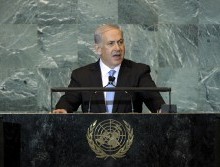The rhetoric on Iran’s nuclear program continues to intensify, with Israeli Prime Minister Benjamin Netanyahu again raising the need for the international community to lay out red lines on Tehran. In an oblique reference to a potential Israeli military strike to prevent Iran from acquiring nukes, Netanyahu said the world hasn’t earned the right to put a “red light” before Israel, which considers a nuclear-armed Iran an existential threat.
“The world tells Israel: Wait. There’s still time. And I say: Wait for what? Wait until when? Those in the international community who refuse to put red lines before Iran don’t have a moral right to place a red light before Israel,” Netanyahu was quoted as saying in a press release.
Speaking to in a press conference with Bulgarian PM Boyko Borisov, Netanyahu contrasted ongoing sanctions and diplomacy with his demand the world give Iran clear red lines they will not allow Tehran to cross.
“So far we can say with certainty that diplomacy and sanctions haven’t worked. The sanctions have hurt the Iranian economy, but they haven’t stopped the Iranian nuclear program. That’s a fact. And the fact is that every day that passes, Iran gets closer and closer to nuclear bombs,” said the Israeli leader.
“If Iran knows that there is no red line, if Iran knows that there’s no deadline, what will it do? Exactly what it’s doing: It’s continuing without any interference towards obtaining nuclear weapons capability and from there nuclear bombs.”
Netanyahu’s comments come one day after a US spokesperson said making public red lines on Iran’s nuclear progress is “not useful.”
“The American people know that the President [Barack Obama] has said, unequivocally, he will not allow Iran to obtain a nuclear weapon. I’m not going to get into how you unpack exactly what, who, how, when,” Victoria Nuland was quoted as saying on Monday in comments released by the State Department. “…So we are absolutely firm about the President’s commitment here, but it is not useful to be parsing it, to be setting deadlines one way or the other, redlines.”
The back and forth comes just weeks before Netanyahu is set to address the United Nations in the annual General Assembly in New York. He is planning to discuss the Iranian threat in his speech. The UN summit could also offer a time for Israeli officials to again meet face-to-face with US officials to compare notes on Iran, a process Nuland said on Monday is continual.
“Prime Minister Netanyahu today, or yesterday, made absolutely clear in his own public statements that we are in a constant dialogue. So from that perspective, we are in absolute agreement on the necessity to stay in conversation, to do it constantly going forward. And we will do that,” she said.
“…We need to continue to work through these issues, make sure that we are comparing notes on what we are seeing, make sure we are comparing notes on the best way to increase the pressure on Iran to come clean with the international community and come back into compliance. And that is what we are doing.”
(By Joshua Spurlock, www.themideastupdate.com, September 11, 2012)

